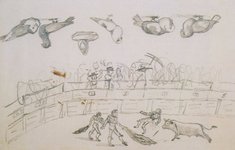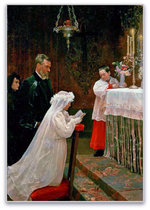Dogestoevsky
Mame
That’s a great question! We all start somewhere, and that level of skill / vision / interest varies widely. Picasso’s early work is a great example. At 11 his figure drawings were lively and somewhat proportional, though rough in the way we would expect from a child. But by 16 he produces an oil painting of a first communion with high representational accuracy.Would you say, as an artist and instructor, that anybody -who really wants- can reach the level of the Master (teacher) ? I mean, when Leonardo DeVinci was a young student, he made a 3/4 portrait that was so great (unique, & different), that his master (teacher) said Leonardo was already a far better artist than him. I think you can progress greatly by aquiring technics (with the desire as you say) but i don't think anybody can copy a DaVinci painting so perfectly that the experts can't make the difference ? What do you think ?


What happened between these two images? His teachers and father (who was a career artist!) often remarked that the young Picasso possessed great talent for painting and drawing; so he was encouraged and educated by adults who worked at a high level. But I think more importantly in those five years he just painted and drew so much (under good guidance) that his technical ability exploded.
All that said, in terms of its conceptual merits the first communion is not a particularly interesting work. It it reflects a young person’s interest in the trade, and rapid development in representational drawing.
I have students who excel at drawing from life, but haven’t found a reason to care. Either they eventually discover a reason, they manufacture reasons until their interest is piqued, or they discover they just don’t need to draw and move on with their lives.
To answer your question about a student who badly wants to be an artist but doesn’t possess much ability, their success or failure will depend largely on how much they practice their technical and conceptual skills. Two very different things there… and eventually the conceptual must supersede the technical for an artist to maintain interest and growth.
sorry for the wall of text! Cheers
Oh! And to your question about copying a Leonardo— it would be recognized as a copy forensically, but on the surface could look very much like the original if great care is taken. We have students copy things all the time, it’s a great exercise.
